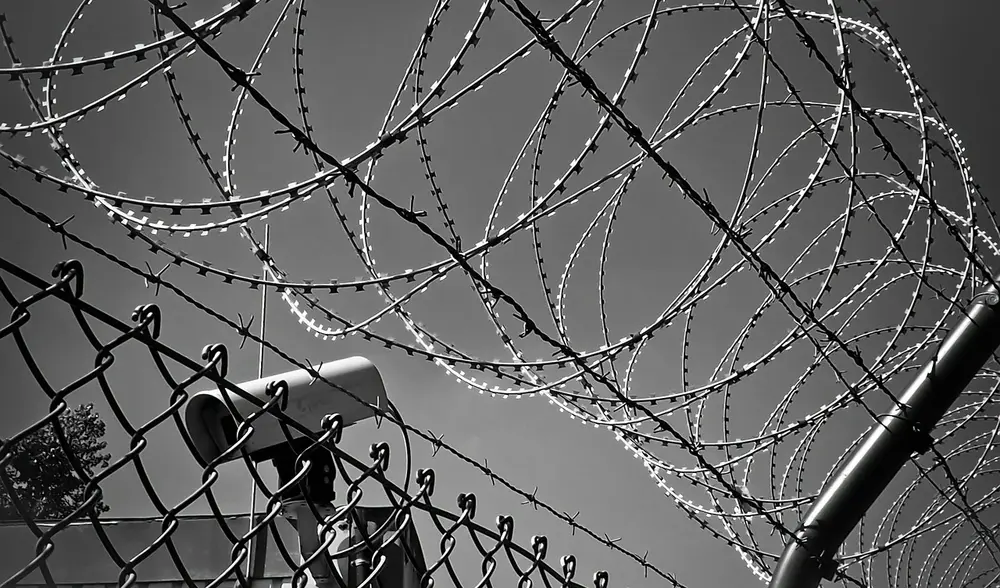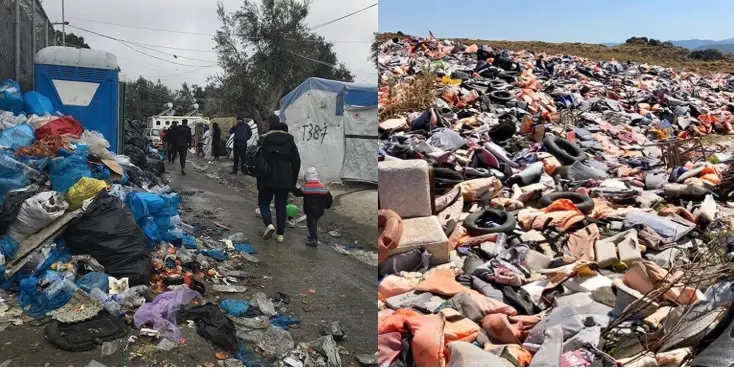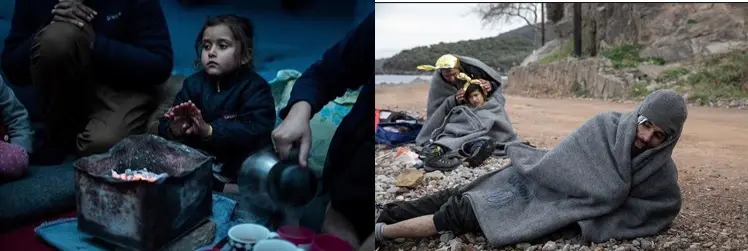Political tensions between Greece and Turkey (Part 2/3)

Refugees as puppets of political interests
Arab refugees are mercilessly exploited and routinely misinformed in order to lure them to a certain region, and then brutally used as a means of political pressure.
By presenting the current deteriorating situation in Camp Moria, we gave just one example about what humanitarian catastrophe is taking place at this very moment. The situation on the Greek-Turkish border is getting worse, with tensions explosively high. In late February, Turkish President Recep Tayyip Erdogan announced that “the gates are open” towards Europe. However, the Greek border police has not let anyone through, shooting at refugees and migrants attempting to cross the border with water cannons and tear gas (Bellut et. al 2020).
The EU accuses Erdogan of deliberately organizing the refugee’s transport from the Syrian-Turkish to the Greek-Turkish borderline. The EU budget commissioner, Johannes Hahn, stated that the flow of refugees is “of course being steered”. Erdogan denies that, but photos and videos by independent journalists show caravans of buses, forming the so-called “hope convoy”, departing Istanbul towards the Greek border; currently about 35,000 migrants have massed at the frontier crossing (Fox 2020).
“They said it was open, but why would the Turkish president say that if the Greek side is closed?” a Syrian refugee questions desperately. This is the result of doing business with hope conducted by targeted misinformation. Many migrants seeking asylum cannot return from the frontier zone because the “hope convoy” charged about $32 for a bus ride to the Greek border, depleting their savings and leaving them with nothing. Migrants are effectively forced to remain at the border since they have no means to return; “I’ll wait here until they open the border,” an Afghan refugee says.

The conditions in which people who fled from violence, war and poverty find themselves are pathetic. The thousands of migrants are camping in the open and erecting shelters from whatever they find, suffering from a shortage of food because international help organizations are not being let in to provide at least some emergency support. “The events at the Greek-Turkish border clearly point to politically motivated pressure on the EU’s external border,” states Ursula von der Leyen, President of the EU Commission (Baczynska 2020).
What’s the background to these barbaric games?
Since 2011, the ongoing war in Syria has displaced thousands of lives and created refugees, at the same time the EU is under pressure to prevent a repeat of the refugee crisis experienced in 2015. Therefore, the EU-Turkey agreement concluded in 2016 provides for the repatriation to Turkey of immigrants who have entered Greece illegally. In return, Turkey would be given financial relief of six billion euros between 2016 and 2019, with Turkey denouncing that this condition has not been met. Beginning of March 2020, Erdogan broke the deal (Dick et. al 2020).
The Turkish president’s main complaint is that by February 2020 only 4.7 billion euros had been approved for projects and only 3.2 billion euros of the approved amount had been transferred to Turkey. However, the disbursement of the aid funds has been delayed because of the mistrust towards Ankara caused by the growing decline of democracy, freedom of the press and the rule of law in Turkey. Turkey has also been criticized by the EU about misusing aid money intended for Syrian refugees and directing the funds to the Erdogan government, bypassing international aid organizations as it is often demanded in aid packages.(Bellut et. al 2020).
Simultaneously, Erdogan tries to pin Greece and the EU against each other and has appealed officially to Greece to “open the gates as well and be free of this burden. Let them go to other European countries”. At the same time, Erdogan accuses Greece of seeking to extract financial gains from the EU over the crisis. The Greek Prime Minister Kyriakos Mitsotakis stated on Twitter that “no illegal entries into Greece will be tolerated” and exposed the possibility to apply for asylum for one month (Fox 2020). Four million Syrians could press for a border crossing at the Greek-Turkish border in the coming weeks (Boffey 2020).
Further political conflicts carried out at the expense of refugees
Erdogan also uses this current tense situation at the border to exert pressure on the EU for a commitment of support in the Syrian war against its president Bashar al-Assad, who in turn is supported by Russia. Turkey expects NATO or EU military support to protect its soldiers inside Syria since Assad has not pulled out his soldiers from the de-escalation zone in Idlib, mapped out under the 2018 Sochi agreement between Turkey and Russia (Fox 2020). However, that support is unlikely to materialize due to Russia’s immense and continuous presence in Syrian airspace. Erdogan also has kept increasing the number of soldiers in Syria. Both parties do not abide by the above mentioned agreement, which complicates the achievement of Erdogan’s goal of the EU negotiating and persuading a ceasefire with Russia as well as the approval for the establishment of a security zone in northern Syria (Bellut et. al 2020) (Lobstein et. al 2020).
Second, the achievement of support is questionable because Greece is vetoing the formerly confirmed NATO air support due to the migrant influx at its borders. Greece demands Turkey to comply with the EU Refugee Convention of 2016 and defuse the situation at the frontier, and eventually Turkey would still receive the agreed financial support (Riegert 2020).
Turkey is bearing a heavy burden with the accommodation of almost four million refugees, therefore the national pressure on Erdogan is rising. The approval of Erdogan’s refugee policy as well as Turkish intervention in Syria, where hundreds of Turkish soldiers have been killed, is increasingly becoming unpopular among the Turkish population and there is no imminent end in sight (Lobstein et. al 2020).
Media creates tension between populations
While seeking support from the EU, what the Turkish media is currently reporting can be described downright as a propaganda battle against Greece and the EU: Turkish pro-government media are spreading the prospect of Greece mercilessly fighting people who had previously fled from hunger, misery and war. Europe – and especially Greece – is portrayed by many newspapers as “cruel” or “brutal” because they reject refugees at the border. An Islamic-fundamentalist Turkish daily newspaper tries to paint a picture of “Europe without conscience” and that “the Greeks let [the refugees] die. The Turkish forces have saved them” (Bellut et. al 2020).
Therefore it’s no surprise to see that hatred is also stirred up in the Greek media. The ultra-national newspaper “Makeleio” proposes “to march into Turkey now”. The impression is that the country is currently experiencing a military conflict – there is constant talk of “invaders” or “intruders” (ibid.).
The refugees who try to reach Greece have one thing in common: they dream of a future in a safe and peaceful Europe. Meanwhile, the Greek and Turkish governments also have something in common: the instrumentalization of these people for political purposes and as a means of exerting pressure on the West as well as a stimulator of nationalist feelings.
Where those feelings leads us in view of the present situation, we’ll get to know in part three of our column.
References
Baczynska, G. (2020, March 9). “EU tells Turkey to pull migrants back from Greek border”. Reuters. Retrieved from: www.reuters.com/article/us-syria-security-turkey-vonderleyen/eu-tells-turkey-to-pull-migrants-back-from-greek-border-idUSKBN20W1AU
Bellut, D.; Simeonidis, K.; Öğreten, T. (2020, March 5). “Ankara, Athen und das gefährliche Spiel mit den Flüchtlingen”. Deutsche Welle. Retrieved from: https://www.dw.com/de/ankara-athen-und-das-gef%C3%A4hrliche-spiel-mit-den-fl%C3%BCchtlingen-griechenland-t%C3%BCrkei/a-52640600
Boffey, D. (2020, March 9). “EU and Turkey hold ‘frank’ talks over border opening for refugees”. The Guardian. Retrieved from: www.theguardian.com/world/2020/mar/09/turkey-erdogan-holds-talks-with-eu-leaders-over-border-opening
Fox, T. (2020, March 2). “Erdogan’s Empty Threats”. Foreign Policy. Retrieved from: https://foreignpolicy.com/2020/03/02/turkey-opens-borders-to-migrants-crossing-to-greece/
Riegert, B. (2020, March 4). “Europa schottet sich ab: Was ist 2020 anders als in der Flüchtlingskrise 2015?”. Focus. Retrieved from: www.focus.de/politik/ausland/in-fluechtlingskrise-ist-2020-nicht-2015-doch-es-gibt-eine-erstaunliche-parallele_id_11730381.html
Dick, W.; Staudenmaier, R. (2020, March 6). “Flüchtlingslage wie 2015 darf sich nicht wiederholen”. Deutsche Welle. Retrieved from: www.dw.com/de/fachleute-fl%C3%BCchtlingslage-wie-2015-darf-sich-nicht-wiederholen-grenzschutz-bamf-unterk%C3%BCnfte/a-52646139
Lobstein, C.; Thumann, M. (2020, March 18). “Griechische Grenze: Chance oder Schande?”. Die Zeit. Retrieved from: www.zeit.de/2020/13/griechische-grenze-tuerkei-fluechtling-abkommen
Authors:
Charlotte Lydia Bock: Charlotte has a Bachelor’s degree in Economic Science from the University of Stuttgart-Hohenheim. Her recent internships she completed at the research institute CINEP in Colombia and at GIZ’s Public-Private-Partnership department in Germany. Further work experience in development cooperation she gained with AIESEC in Indonesia.
Andrés Escobar: Andrés holds a Master’s degree in Administration from the University of Antioquia, a Bachelor’s degree in International Business from the University ESUMER as well as the Bachelor of Public Accounting from the University of Antioquia.
“The views represented in this opinion piece do not necessarily represent those of the Willy Brandt School of Public Policy.”
~ The views represented in this blog post do not necessarily represent those of the Brandt School. ~
